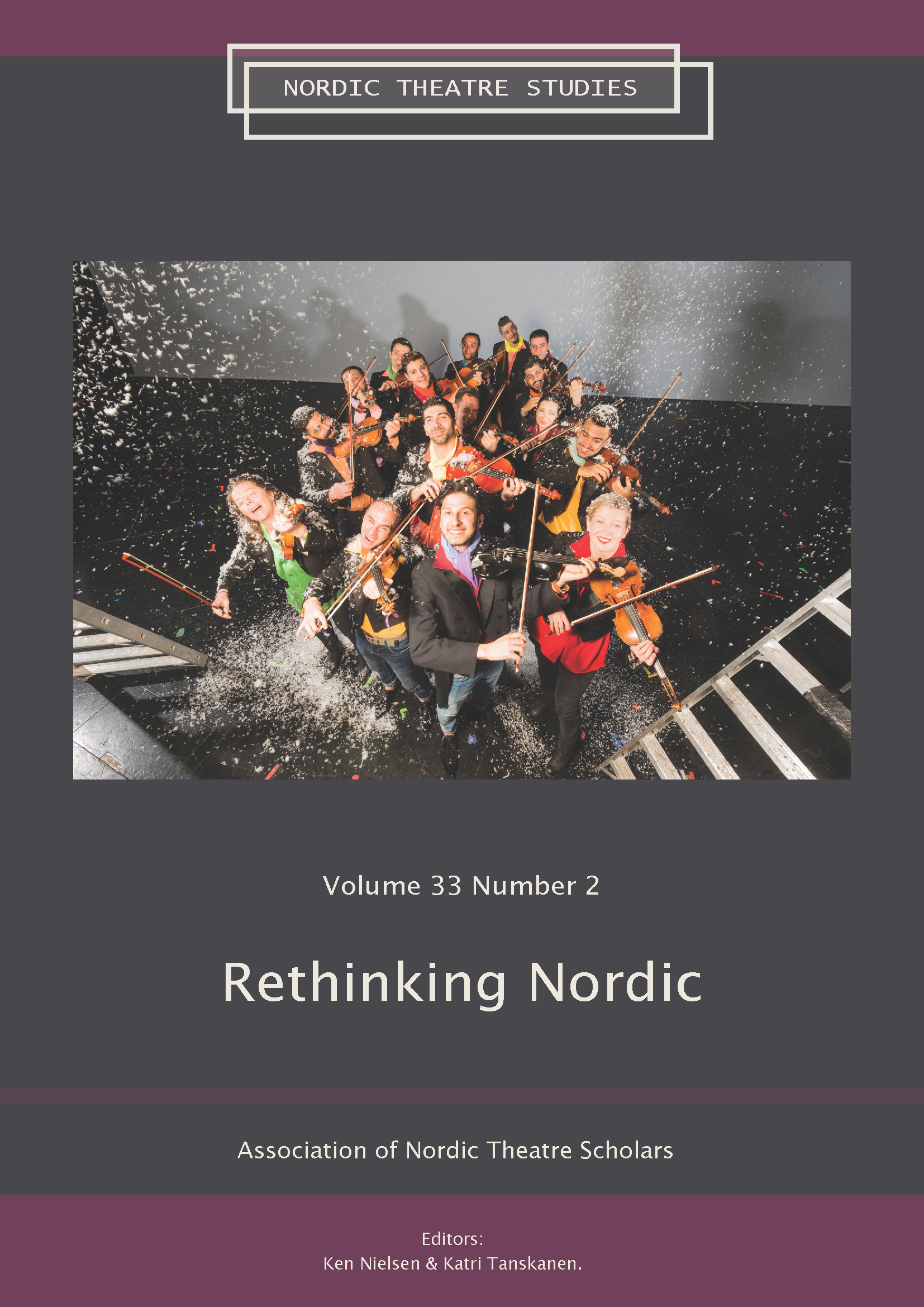Nordic Gore?
Strangers, Foreigners, and the Communities We Imagine for Ourselves
DOI:
https://doi.org/10.7146/nts.v33i2.132870Keywords:
Stockholm Bloodbath, Nationalism, Nordic, Strangeness, Globalization, Performance analysisAbstract
The idea of a Nordic community, even though it was a reality in the past and is still a quite tangible idea in the present – because all Nordic countries have
striking similarities – is often obscured by the more recent idea that the nation always comes first, and for quite some time now the Nordic countries have
been anxious to set themselves apart from their closest neighbour in particular.
In this paper, I will examine a rare – and at that, an unusually bloody and
messy – Swedish-Danish theatre collaboration, Stockholms blodbad (Stockholm Bloodbath), which was staged at Malmö City Theatre, in Skåne, the southernmost of the historical provinces of Sweden, in the fall of 2016. Stockholms blodbad seemed to revive the idea of a “pure” Nordic community beneath the final coat of national varnish, but the intent was primarily to subvert and make fun of nationalistic sentiments while re-awakening a well-known, historical
event in the intertwined pasts of these nations.
When Stockholms blodbad premiered in 2016, the differences between Sweden and Denmark and the sense of Skåne being a border territory had
been amplified by recent events and different policies regarding what is now known as “Flyktingkrisen” (The European refugee and migrant crisis) in the
spring of 2015. “Flyktingkrisen” reminded us of the fact that we now live in an increasingly globalized world. Stockholms blodbad seemed to deny it. As
long as nationalism skews our thoughts and perceptions of the past and the present it is impossible to imagine a future that is habitable and hospitable to
all humanity.
References
Anderson, Benedict (1991). Imagined Communities: Reflections on the Origin and Spread of Nationalism, 2nd edn, London & New York: Verso.
Benér, Theresa. ”Frifräsande scencollage som gapar över mycket”, i Svenska Dagbladet, 2016.09.19
Carlson, Marvin (2001). The haunted stage: the theatre as memory machine. Ann Arbor: University of Michigan Press.
Dasgupta, Rana. “The Demise of the nation state”, in The Guardian, 2018.04.05.
Daun, Åke (1988). “Svenskhet”, in Ingvar Svanberg & Harald Runblom (eds.), Det mångkulturella Sverige, Stockholm: Gidlunds förlag, p. 411-415.
Gurvitch, Georges (1955). ”The Sociology of the Theatre”, in Elizabeth and Tom Burns (eds.)(1973). Sociology of Literature & Drama, Harmondsworth: Penguin Books, p. 71-81.
Harari, Yuval Noah (2019). 21 Lessons for the 21st Century, London: Vintage.
Lind, Kalle. ”Danskan provocerar mer än både nakenchock och blodbad”, in Sydsvenskan 2016.09.30
Loman, Rikard. ”Blodbadet skildras alltför konfliktfritt”, in Dagens Nyheter, 2016.09.19
Malmö Stad. https://malmo.se/Fakta-och-statistik/Befolkning.html
McConachie, Bruce (2010). “Theatre, nation, and empire 1750-1900”, in Zarilli, P. (ed.), Theatre histories: an introduction. (2nd ed.) New York: Taylor & Francis Group, p. 270-285.
Noeth, Sandra (2017). “A New War on Borders”, in Gabriele Brandstetter & Holger Hartung (eds.), Moving (Across) Borders. Performing Translation, Intervention, Participation, Bielefeld: transcript Verlag, p. 117-134.
Pfister, Manfred (2008). ”Introduction”, in Performing National Identity: Anglo-Italian Cultural Transactions (Internationale Forschungen zur allgemeinen und vergleichenden Literaturwissenschaft, 0929-6999 ; 114) [E-book]. Rodopi, p. 9-28.
Renan, Ernest (2018). What is a Nation? And other political writings (1882), New York: Columbia University Press.
Rian, Øystein (2005). ”Skåne som sentrum i det danske imperiet og periferi i det svenske riket”, in Steinar Imsen (ed.) Grenser og grannelag i Nordens historie, Oslo: Cappelen, p. 208-222.
Robertson, David (1985). A Dictionary of Modern Politics, London: Europa Publications.
Rumsford, Chris (2013). The Globalization of Strangeness, Basingstoke: Palgrave Macmillan.
Sauter, Willmar (2000). The theatrical event: dynamics of performance and perception. Iowa City: Univ. of Iowa Press.
Tacitus. On Germany, translated by Thomas Gordon,
https://www.gutenberg.org/files/2995/2995-h/2995-h.htm
Westling, Barbro, ”Allvar – på blodig lek”, in Aftonbladet, 2016.09.26
Wilmer, S. E (2012). “Theatrical Nationalism and Subversive Affirmation”, in Megan Alrutz, Julia Listengarten and M. Van Duyn Wood (eds.), Playing with Theory in Theatre Practice, Basingstoke & New York: Palgrave MacMillan, pp. 86-101.
Wise, John Macgregor (2008). Cultural globalization: a user’s guide. Malden, MA: Blackwell.
Østergaard, Uffe (2015), ”Nationalstaten fösvinner inte”, in Respons (Journal), issue number 4, p. 18-23.
Downloads
Published
How to Cite
Issue
Section
License
The copyright belongs to the authors and Nordic Theatre Studies. Users can use, reuse and build upon the material published in the journal but only for non-commercial purposes. Users are allowed to link to the files, download the files, distribute the files on a local network (preferably by links), upload the files to local repositories if their institutions require them to do so, but not republish the files without proper agreements with the journal and the author.

